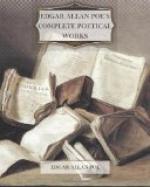1839.
[Footnote 1: A star was discovered by Tycho Brahe which appeared suddenly in the heavens—attained, in a few days, a brilliancy surpassing that of Jupiter—then as suddenly disappeared, and has never been seen since.]
[Footnote 2: On Santa Maura—olim Deucadia.]
[Footnote 3: Sappho.]
[Footnote 4: This flower is much noticed by Lewenhoeck and Tournefort. The bee, feeding upon its blossom, becomes intoxicated.]
[Footnote: Clytia—the Chrysanthemum Peruvianum, or, to employ a better-known term, the turnsol—which turns continually towards the sun, covers itself, like Peru, the country from which it comes, with dewy clouds which cool and refresh its flowers during the most violent heat of the day.—’B. de St. Pierre.’]
[Footnote 6: There is cultivated in the king’s garden at Paris, a species of serpentine aloe without prickles, whose large and beautiful flower exhales a strong odor of the vanilla, during the time of its expansion, which is very short. It does not blow till towards the month of July—you then perceive it gradually open its petals—expand them—fade and die.—’St. Pierre’.]
[Footnote 7: There is found, in the Rhone, a beautiful lily of the Valisnerian kind. Its stem will stretch to the length of three or four feet—thus preserving its head above water in the swellings of the river.]
[Footnote 8: The Hyacinth.]
[Footnote 9: It is a fiction of the Indians, that Cupid was first seen floating in one of these down the river Ganges, and that he still loves the cradle of his childhood.]
[Footnote 10: And golden vials full of odors which are the prayers of the saints.—’Rev. St. John.’]
[Footnote 11: The Humanitarians held that God was to be understood as having really a human form.—’Vide Clarke’s Sermons’, vol. I, page 26, fol. edit.
The drift of Milton’s argument leads him to employ language which would appear, at first sight, to verge upon their doctrine; but it will be seen immediately, that he guards himself against the charge of having adopted one of the most ignorant errors of the dark ages of the Church.—’Dr. Sumner’s Notes on Milton’s Christian Doctrine’.
This opinion, in spite of many testimonies to the contrary, could never have been very general. Andeus, a Syrian of Mesopotamia, was condemned for the opinion, as heretical. He lived in the beginning of the fourth century. His disciples were called Anthropomorphites.—’Vide du Pin’.
Among Milton’s minor poems are these lines:
Dicite sacrorum praeesides nemorum Dese,
etc.,
Quis ille primus cujus ex imagine
Natura solers finxit humanum genus?
Eternus, incorruptus, aequaevus polo,
Unusque et universus exemplar Dei.
—And afterwards,
Non cui profundum Caecitas lumen dedit
Dircaeus augur vidit hunc alto sinu, etc.]




